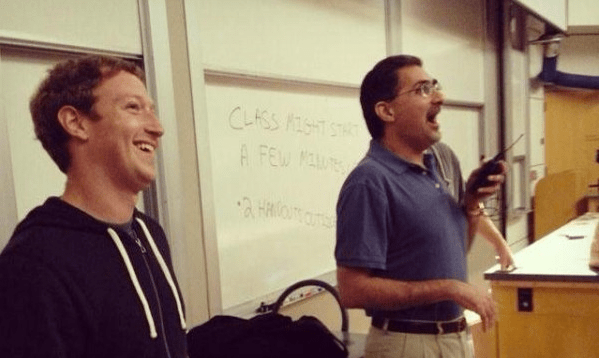Facebook Chief Technology Officer Mike Schroepfer and Director of Engineering Jocelyn Goldfein spoke at the she++ conference today, making Facebook by far the most represented company at the Stanford conference.
Their public remarks and comments shed light on Facebook’s aggressive strategy to recruit talented engineers to join their “deep bench” — the company’s greatest asset, according to Goldstein.
“When you look at the numbers of CS majors that are graduating—where are we going to get more from?” Goldfein tells me. “The fact that women are such a small percentage of CS majors when they’re such a large percentage of undergraduates is kind of the missing link. And it’s really obvious when you think about it.”
“The numbers are a challenge,” Schroepfer explains. “There are just fewer women graduating and fewer women in the industry. So I think there’s just a smaller pool of people and I think, because of that, if Facebook had gender parity, then everyone else in the industry wouldn’t, just statistically. So our first problem is not a Facebook problem, it’s an industry problem.”
Goldfein has been heavily involved with she++, appearing in the documentary and speaking at both conferences. Schroepfer says the company does work with the Anita Borg Institute and Grace Hopper conference as well.
For the past few years, Schroepfer and Facebook CEO Mark Zuckerberg have guest lectured once per quarter in Stanford’s introductory CS class; it’s become both a unique aspect of one of Stanford’s most popular classes and a great recruiting event for Facebook.
“A lot of people take CS106A, the intro to computer science class, and it’s a phenomenal class, I think it’s the largest enrollment they’ve ever had this year,” he tells me. “But what you see happen is people take the class and then they move on to other things. They don’t actually end up majoring in computer science or being a professional in engineering. A lot of what we’re trying to do is just show up to the class and show people what it’s like to do this in the real world.”

Mark Zuckerberg in CS 106A with Stanford professor Mehran Sahami (Courtesy of Jacob Chen/The Dish Daily).
“Facebook has focused very hard on claiming our disproportionate share of the women that are out there,” Goldfein tells me. “Just like we want our disproportionate share of the people with iPhone experience, and we want our disproportionate share of the people with Kernel experience. There are a set of scarce, valuable, talent pools in software and we’re out to get more than our share. But that’s not a winning approach for the whole industry. Everybody can’t do that.”
Goldfein and Schroepfer say they then turn their attention to the “pipeline problem” and work to increase the total number of software engineers in the world, namely by increasing the number of women.
“We put a lot of energy into trying to find more women, because fundamentally for us it’s an applicant pool problem,” Goldfein says. “When women interview with us, we want to hire them and they want to work for us. Those numbers are great. The trouble is, there are just very few women we can find in the candidate pool.”
This summer, the company is experimenting with a program called Facebook University to “reach further up the pipeline.” While traditional Facebook summer interns are college juniors and seniors or graduate students in computer science, the company wants to reach students finishing their freshman year of college; Goldfein says they will teach these students principles of coding, particularly for mobile, and give them a taste of what working at Facebook is like. She says the inaugural Facebook U class for this summer is 30 students, two thirds of whom are female.
Follow InfotechArena on Twitter @InfotechArena and Facebook

No comments:
Post a Comment